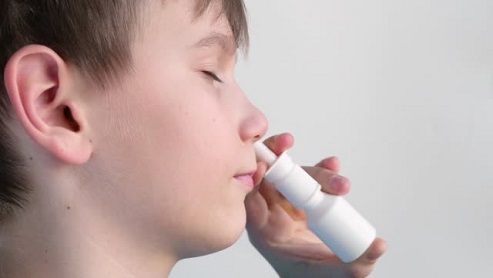Study Shows Potential Of Combining Iota-Carrageenan And Xylitol As A Potential Prophylactic Nasal Spray For COVID-19
Source: COVID-19 Prophylactics-Therapeutics Nov 26, 2021 4 years, 2 months, 4 weeks, 10 hours, 45 minutes ago
COVID-19 Prophylactics-Therapeutics: Researchers from the University of Tennessee Health Science Center-USA and Instituto de Ciencia y Tecnología-Argentina have in a new study demonstrated that a combination of iota-carrageenan and xylitol inhibit SARS-CoV-2 in Vero cell culture, paving the way for the development of a prophylactic and therapeutic nasal spray for COVID-19.

Since the nasal cavity and the rhinopharynx are the sites of initial replication of SARS-CoV-2, a nasal spray may be an effective option to target SARS-CoV-2 infection.
The
COVID-19 Prophylactics-Therapeutics study team tested the antiviral action of three candidate nasal spray formulations against SARS-CoV-2
in vitro.
The team determined that iota-carrageenan in concentrations as low as 6 μg/mL inhibits SARS-CoV-2
in vitro. The concentrations of iota-carrageenan with activity against SARS-CoV-2
in vitro may be easily achieved through the application of nasal sprays as commonly used in several countries. Recently a double-blind, placebo-controlled study showed that iota-carrageenan in isotonic sodium chloride reduces ca. five times the risk of infection by SARS-CoV-2 in health care personnel. Further, xylitol at a concentration of 50 mg/mL (ca. 329 mM) was found to exert some antiviral action, though this preliminary finding needs further confirmation.
The study findings were published in the peer reviewed journal: PLOS ONE.
https://journals.plos.org/plosone/article?id=10.1371/journal.pone.0259943
As of November 26, 2021, SARS-CoV-2 has infected more than 260 million people and caused more than 5.2 million deaths worldwide.
Currently vaccines are the primary preventative measure that can be taken to protect individuals against coronavirus disease 2019 (COVID-19). However, due to the emergence of SARS-CoV-2 variants, vaccine effectiveness has been threatened.
Hence, there remains an urgent need to develop easily usable, effective, and affordable prophylactics and treatment options.
As the pathogenesis of SARS-CoV-2 starts at the nasal cavity and rhinopharynx, many researchers believe that nasal sprays with antiviral properties may be an effective option to attack the virus and reduce the viral load.
Numerous past studies have suggested that the use of nasal sprays containing iota-carrageenan, as this compound is already being used in many countries for treating coronaviruses that cause the common cold.
https://www.thailandmedical.news/news/covid-19-research-american-led-study-shows-that-nasal-sprays-with-xylitol-and-iota-carrageenan-might-help-protect-against-covid-19
Due to its widespread use in many parts of the world, iota-carrageenan is safe in both adults and children and has proven to be effective in r
educing clinical symptoms and viral load in the nasal cavity.
The compound Xylitol is generally used in otorhinolaryngology in the form of an antibacterial nasal spray for treating rhinosinusitis and preventing otitis media. Xylitol has demonstrated antiviral properties both in vitro and in vivo against the syncytial virus.
Detailed pre-clinical studies using both iota-carrageenan and xylitol have shown no systemic toxicity, immunotoxicity, or immunogenicity. Both of these compounds appear to be well tolerated in humans and are already in clinical use for other infections.
The study team determined the inhibition capacity of iota-carrageenan and xylitol in three different candidate preservative-free formulations. The antiviral activity of iota-carrageenan was based on the principle of electrostatic attraction between its negatively charged molecules and positively charged viral particles.
The study team investigated three different formulations including 50 mg/mL xylitol and 9 mg/mL sodium chloride, 50mg/mL xylitol and 5 mg/mL sodium chloride, and xylitol without any electrolytes. Each of the three sample formulations was investigated in a dose-dependent manner based on varying concentrations of iota-carrageenan ranging from 600 μg/mL to 0.6 μg/mL. The outcomes of the study were determined by calculating virus titers after treatment with each developed formulation for each concentration of iota-carrageenan.
The study findings were consistent with the earlier reports about the anti-viral action of iota-carrageenan due to electrostatic attraction. This attraction between oppositely charged particles decreases as ionic strength increases.
As such, iota-carrageenan is believed to be an effective antiviral against SARS-CoV-2 in lower ionic strength media.
It was found that when SARS-CoV-2 samples were treated with varying concentrations of iota-carrageenan alone, the study team found significant reductions in virus titers at all doses.
Surprisingly, xylitol was also found to exhibit anti-viral properties alone as well.
Importantly, all combination treatments with both iota-carrageenan and xylitol resulted in viral titers that were below the limit of detection.
It should also be noted that the treatment of SARS-CoV-2 cells with 60 µg/ml of iota-carrageenan was the only treatment using this drug alone that caused any significant reduction in cell viability.
However, this finding was not usual, as neither 0.5% sodium chloride nor any other dose of iota-carrageenan alone was found to damage Vero cells in any other experiment. It should be noted that the combination of iota-carrageenan and xylitol at any concentration did not have a significant effect on cell viability.
The study findings provided evidence that iota-carrageenan can inhibit SARS-CoV-2 in vitro. Thus, the study team believe that their findings, along with previous studies reporting the anti-viral activity of iota-carrageenan, can support the development of a nasal spray using this compound in the treatment of COVID-19.
Though xylitol alone appeared to exhibit antiviral effects against SARS-CoV-2, further work will need to be conducted to better understand the antiviral potential of combination treatment using both iota-carrageenan and xylitol.
For the latest
COVID-19 Prophylactics-Therapeutics, keep on logging to Thailand Medical News.
Read Also:
https://www.thailandmedical.news/news/yet-another-covid-19-prophylactic-intranasal-spray-debuting,-this-time-by-university-of-birmingham
